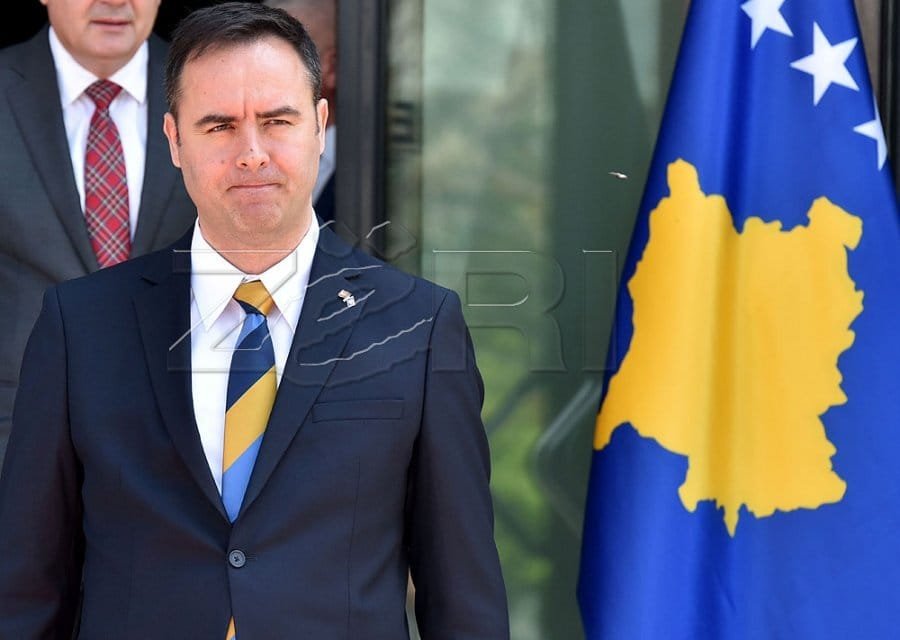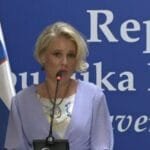The President of the Assembly of Kosovo, Glauk Konjufca, stated that all state instances must adhere to Prime Minister Albin Kurti’s conditions for dialogue.
The Speaker emphasized that without punishing the perpetrators of the terrorist attack in Banjska, there can be no peace in the region, while highlighting that hundreds of individuals in Serbia are preparing for another attack on Kosovo.
After his meeting with his Slovenian counterpart, Urška Klakočar Zupančič, Konjufca said that Kosovo’s institutions are prepared to face any attack or provocation from Serbia. On the other hand, the Slovenian Speaker said that issues between Kosovo and Serbia must be resolved through dialogue; otherwise, events similar to those in Ukraine could happen. She stressed the need for the dialogue to end with mutual recognition, adding that the mediator should be from a country that recognizes the sovereignty of both countries.
“First, let’s talk about what has been called Serbia’s impunity regarding the agreement. Precisely because of this, Serbia has taken the position of not implementing the clauses of the agreement we reached in Brussels… Serbia, based on impunity, is not implementing it. Mr. Kurti first asked for clarification on the agreement. Secondly, the issue of the main criminal Radoičić, who has taken responsibility for the Banjska attack, is free in Serbia and the act is treated by the Serbian state almost as a minor traffic violation… And thirdly, the letter that former Prime Minister Brnabić sent to European institutions devaluing the agreement reached in Brussels… Every instance after the government and the formulation of these conditions must maintain that stance,” he said.
The Speaker of the Slovenian Assembly, Urška Klakočar Zupančič, called for commitment to dialogue from both sides.
“(Mutual recognition) This can help if both countries recognize each other and have reciprocity in their recognition. Neighboring countries can try to influence this, we want to see that our influence will be positive in this direction. I think this (mutual recognition) would be very welcome for both countries… Both countries will have difficulty solving this without the help of others; some key EU countries will help you in this aspect. It is also important for third countries to recognize the sovereignty of both countries because then both countries will be on the same level. If we have third countries that do not recognize Kosovo, it becomes more difficult,” emphasized Zupančič.
Considering it essential for the perpetrators of the terrorist attack in Banjska to face Kosovo’s justice, Konjufca said there is accurate information that another group is preparing for an attack on the country.
“We cannot talk about good neighborliness and peace in the region without punishing and bringing to justice the perpetrators of this crime (the terrorist attack in Banjska) and without addressing such destabilizing efforts… Our institutions have accurate information that another group of hundreds of people is again doing the same thing in Serbia, training and preparing for a possible attack that we may experience. But we are always prepared, and our security institutions are at the highest alert to face any attack or provocation from Serbia,” said Konjufca.
Meanwhile, the Speaker of the Slovenian Assembly, Urška Klakočar Zupančič, said it is essential that issues between Kosovo and Serbia be resolved through dialogue, as otherwise, events similar to the war in Ukraine could happen.
“Unilateral decisions by Serbia to choose which clauses of the agreement to implement and which not are not well received by the international community when we must respect the rights of all nations living here. As politicians, we like to talk a lot about dialogue; sometimes it may seem like a cliché, but if we do not resolve issues through dialogue, we may see bad things like in Ukraine. Because we do not pay attention to situations that can lead to war. I understand the frustration in Kosovo; we have agreements that have not been implemented, a terrorist attack where one person took full responsibility but has not been punished for it. There is a lot of frustration; it is understandable and clear. I want to see Serbian authorities change their perspective and be more open in talks,” she said.
Regarding the Banjska case, Speaker Konjufca said the reaction from Borrell’s office that Kosovo had not sent any report was shocking, as the country’s institutions had informed the EU of all details of the Banjska attack.
“In this case, I have seen that they did not act according to the highest European standards. Their private and individual preferences had a significant impact on how they shaped the dialogue. One of the biggest consequences of this approach has been the undeniable favoring of Serbia and placing Kosovo in an unfavorable position… The recent reaction from the EU office and Borrell’s department was shocking, stating that Kosovo had not sent anything about the Banjska attack. On the contrary, the EU and Borrell’s office have all the details down to the last detail of what the Banjska attack was and how it was carried out,” she emphasized.
Alongside these, both counterparts expressed their willingness to deepen cooperation between Kosovo and Slovenia.
During her visit to Kosovo, the Speaker of the Slovenian Assembly, Urška Klakočar Zupančič, was also received in a meeting by President Vjosa Osmani.






